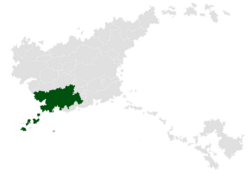Bourgougia: Difference between revisions
mNo edit summary |
No edit summary |
||
| Line 67: | Line 67: | ||
|area_rank = | |area_rank = | ||
|area_magnitude = | |area_magnitude = | ||
|area_km2 = | |area_km2 = 724,511 | ||
|area_sq_mi = | |area_sq_mi = | ||
|percent_water = | |percent_water = | ||
|area_label = | |area_label = Total | ||
|population_estimate = | |population_estimate = | ||
|population_estimate_rank = | |population_estimate_rank = | ||
| Line 122: | Line 122: | ||
|footnotes = <!--For any generic non-numbered footnotes--> | |footnotes = <!--For any generic non-numbered footnotes--> | ||
}} | }} | ||
'''Bourgougia''', officially the '''Democratic Republic of Bourgougia''' is a sovereign state located in south-western Musgorocia. It is governed as a unitary semi-presidential republic. Bourgougia borders the Musgorocian Ocean to the west, Agostinia and Licrasse to the north, Aspinia, Roscait and Cispania to the east, and Côte d'Émeraude, Thouthen, the city-state of [[Victory (city-state)|Victory]] and the Novarian Ocean to the south. | '''Bourgougia''', officially the '''Democratic Republic of Bourgougia''' is a sovereign state located in south-western Musgorocia. It is governed as a unitary semi-presidential republic. Bourgougia borders the Musgorocian Ocean to the west, Agostinia and Licrasse to the north, Aspinia, Roscait and Cispania to the east, and Côte d'Émeraude, [[Thouthen]], the city-state of [[Victory (city-state)|Victory]] and the Novarian Ocean to the south. Excluding territories claimed by Bourgougia but not under its control, i.e the Îles Perlegrise and Victory, the country's land area is 724,511 square kilometres 279,735 sq mi, making it the second large country in Musgorocia, after Barssois. | ||
Historically, Bourgougia was a French colony, gaining its independence during the Musgorocian wars of independence of the 1820s and 30s. Much like in Carloso, the country initially became an absolute monarchy guided by the enlightened despotism of Emperor Auguste I. With its vast natural resources, Bourgougia immediately became a regional power, rivalling both Carloso and Barssois. Following the disastrous Agostinian War, in 1881 Emperor Louis I was forced to abdicate amidst the threat of a socialist uprising. The newly established republic ushered in a period of unprecedented prosperity and growth in Bourgougia. This would last until 1929, when Bourgougia again faced a socialist uprising, triggering a series of events that ultimately led to the election of the Parti Synarchiste Huguenot de Bourgougia (PSHB) in 1939. Its leader, Colonel Marchel Blanchet, appointed himself Dirigeant of Bourgougia, and began to remilitarise and reindustrialise the nation. Seeking to recover the entire territory of colonial Bourgougia, in 1945, Synarchist Bourgougia invaded and annexed Thouthen. In 1946, an invasion of Agostinia triggered the [[Emergency War]], posing Bourgougia and Barssois against the Musgorocian Allies, led by Carloso. Despite initial success against the Allies, following the Miracle at Madrigal, Bourgougia began losing ground, and in 1950 was itself being invaded by enemy forces. In 1951, Carloso revealed its secret nuclear weapons programme and attacked Bourgougian forces with a dozen atomic bombs. Facing nuclear annihilation, the Bourgougian Army overthrew and killed Blanchet, and agreed to an unconditional surrender. | |||
The subsequent occupation of Bourgougia led to the creation of a Carlosian-supported democratic government, but appeared illegitmate in the eyes of many Bourgougians. In 1964, a small group of {{wpl|Blanquism|Blanquist}} military officers launched a coup against the government. | |||
Bourgougia is regarded as a upper-middle-income country, though its economy has struggled to recover from the brutal civil war that ravaged the country after the collapse of communist Bourgougia from the end of the [[Bourgougian Blitz]] until 2003. Recovery has been hampered by sanctions imposed by Carloso and its allies on Bourgougian officials and companies. Besides Cispania, and formerly Thouthen, diplomatic relations with other Musgorocian states are poor. Marius Lemaigre, son of Régis Lemaigre, is the head of the Bourgougian Army. | Bourgougia is regarded as a upper-middle-income country, though its economy has struggled to recover from the brutal civil war that ravaged the country after the collapse of communist Bourgougia from the end of the [[Bourgougian Blitz]] until 2003. Recovery has been hampered by sanctions imposed by Carloso and its allies on Bourgougian officials and companies. Besides Cispania, and formerly Thouthen, diplomatic relations with other Musgorocian states are poor. Marius Lemaigre, son of Régis Lemaigre, is the head of the Bourgougian Army. | ||
Revision as of 07:00, 16 September 2024
Democratic Republic of Bourgougia République démocratique de Bourgougia | |
|---|---|
| Motto: "Splendeur et grâce" (French) "Resplendence and grace" (English) | |
 Location of Bourgougia (dark green) in Musgorocia (grey) – [Legend] | |
| Capital and largest city | Antilet |
| Official languages | French |
| Religion |
|
| Demonym(s) | Bourgougian |
| Government | Unitary semi-presidential constitutional republic |
• President | Aubin Vachon |
• Prime Minister | Eulalie Séguin |
| Legislature | National Assembly |
| Area | |
• Total | 724,511 km2 (279,735 sq mi) |
| Population | |
• 2022 census | 108,272,277 |
| Gini (2022) | medium |
| HDI (2022) | high |
| Currency | Bourgougian franc (B₣) (BFR) |
| Date format | dd/mm/yyyy (CE) |
| Driving side | right |
| Internet TLD | .br |
Bourgougia, officially the Democratic Republic of Bourgougia is a sovereign state located in south-western Musgorocia. It is governed as a unitary semi-presidential republic. Bourgougia borders the Musgorocian Ocean to the west, Agostinia and Licrasse to the north, Aspinia, Roscait and Cispania to the east, and Côte d'Émeraude, Thouthen, the city-state of Victory and the Novarian Ocean to the south. Excluding territories claimed by Bourgougia but not under its control, i.e the Îles Perlegrise and Victory, the country's land area is 724,511 square kilometres 279,735 sq mi, making it the second large country in Musgorocia, after Barssois.
Historically, Bourgougia was a French colony, gaining its independence during the Musgorocian wars of independence of the 1820s and 30s. Much like in Carloso, the country initially became an absolute monarchy guided by the enlightened despotism of Emperor Auguste I. With its vast natural resources, Bourgougia immediately became a regional power, rivalling both Carloso and Barssois. Following the disastrous Agostinian War, in 1881 Emperor Louis I was forced to abdicate amidst the threat of a socialist uprising. The newly established republic ushered in a period of unprecedented prosperity and growth in Bourgougia. This would last until 1929, when Bourgougia again faced a socialist uprising, triggering a series of events that ultimately led to the election of the Parti Synarchiste Huguenot de Bourgougia (PSHB) in 1939. Its leader, Colonel Marchel Blanchet, appointed himself Dirigeant of Bourgougia, and began to remilitarise and reindustrialise the nation. Seeking to recover the entire territory of colonial Bourgougia, in 1945, Synarchist Bourgougia invaded and annexed Thouthen. In 1946, an invasion of Agostinia triggered the Emergency War, posing Bourgougia and Barssois against the Musgorocian Allies, led by Carloso. Despite initial success against the Allies, following the Miracle at Madrigal, Bourgougia began losing ground, and in 1950 was itself being invaded by enemy forces. In 1951, Carloso revealed its secret nuclear weapons programme and attacked Bourgougian forces with a dozen atomic bombs. Facing nuclear annihilation, the Bourgougian Army overthrew and killed Blanchet, and agreed to an unconditional surrender.
The subsequent occupation of Bourgougia led to the creation of a Carlosian-supported democratic government, but appeared illegitmate in the eyes of many Bourgougians. In 1964, a small group of Blanquist military officers launched a coup against the government.
Bourgougia is regarded as a upper-middle-income country, though its economy has struggled to recover from the brutal civil war that ravaged the country after the collapse of communist Bourgougia from the end of the Bourgougian Blitz until 2003. Recovery has been hampered by sanctions imposed by Carloso and its allies on Bourgougian officials and companies. Besides Cispania, and formerly Thouthen, diplomatic relations with other Musgorocian states are poor. Marius Lemaigre, son of Régis Lemaigre, is the head of the Bourgougian Army.
Politics
Military

The Bourgougian Armed Forces are the military of Bourgougia. The President of Bourgougia is the commander-in-chief. It is composed of three branches; the Army, Navy and Air Force. As of 2023, it is believed that the Bourgougian Armed Forces have over 1,100,000 active personnel, with a significant number of reserve personnel and paramilitary forces.
- Bourgougian Navy; 1 aircraft carrier, 2 amphibious landing ships, 10 destroyers, 18 frigates, 24 corvettes, 9 submarines
- Bourgougian Air Force sample equipment: Dassault Mirage G, Dassault Mirage 4000, Dassault Mirage 2000, SEPECAT Jaguar, Dassault-Breguet Super Étendard, Dassault Mirage IV, Pilatus PC-7, Transall C-160
- Bourgougian Army sample equipment: AMX-40, AMX-30, AMX-10P, Panhard AML, Panhard EBR, Mk 61 105 mm Self-Propelled Howitzer


